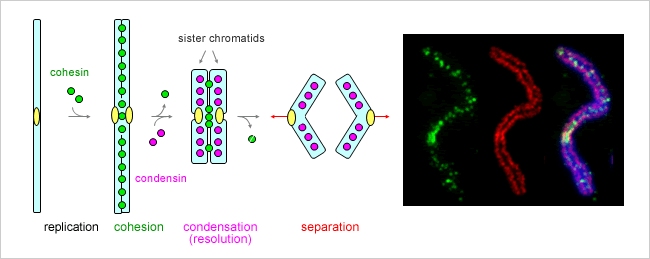Introduction
The duplication and segregation of the genome are two of the most fundamental events in cell reproduction. Our laboratory is interested in understanding the molecular mechanisms that regulate the faithful segregation of chromosomes during mitosis and meiosis. By using a cell-free extract derived from Xenopus laevis (African toad) eggs, we have discovered two multiprotein complexes, condensin and cohesin, that play central roles in chromosome condensation and sister chromatid cohesion, respectively. At the heart of the two complexes lie members of a large family of chromosomal ATPases, the SMC (structural maintenance of chromosomes) family. Accumulating lines of evidence suggest that SMC proteins actively participate in many aspects of higher-order chromosome dynamics, including chromosome-wide gene regulation, DNA recombination / repair and meiotic chromosome segregation.

The long-term goal in our laboratory is to understand how condensin and cohesin work at a mechanistic level in vitro, and how they interact with other proteins to execute their essential functions in vivo. We take multidisciplinary approaches toward this goal, including biochemistry, cell biology, structural biology and biophysics. Our research will contribute to a better understanding of human health because chromosome anomalies, such as aneuploidy and translocations, are tightly associated with tumor development and birth defects.














